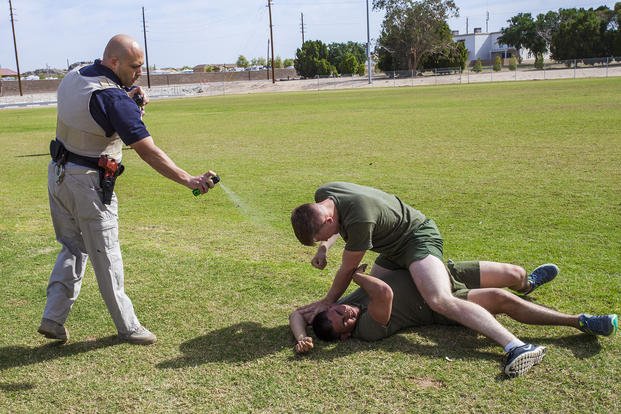Several years ago, I was staying at a hotel in a small New Mexican town I used to live in. This area is heavily populated with brutal gang members who traffic heroin from Mexico into the rest of the United States. I'd dealt with the gangs in the past as a security consultant and bodyguard and knew what they were capable of. Around 1 a.m., I was awakened suddenly from a sound sleep by a piercing scream in the hallway, followed by a man's voice yelling. I jumped up and looked through my door's peephole but couldn't see anything in the hallway in front of my door.
When I heard the second scream, I slowly and cautiously opened my door and peeked out into the hallway to see a young man slapping a woman around and pulling her by her hair back into their hotel room, quickly closing the door. Several other hotel visitors were looking out into the hallway as well and just shook their heads, closed the door and basically went back to bed. From the man and woman's hotel room, I could hear him beating her up in a drunken rage and her muffled screams begging him to stop.
Fortunately, the guy in the room across from me had the same gut instinct I did ... to help this woman out. I told him to run down to the front desk and tell the attendant to call the police and then quickly come back. I didn't feel this woman had time to wait for a response. With both of us now at the door, we knocked, making sure we stood to the side because I knew that if he were one of the local gang members, he was most likely armed. He came to the door and actually opened it up part way. (Alcohol really does make you do stupid things, doesn't it?)
We immediately slammed the door open, knocking him back as he fell down on the floor. As he tried to break his fall, I could see that there was nothing in his hands so no weapon had been drawn yet. As he got up, we took advantage of his drunken, dumbfounded state to motion the woman out of the room, and she was escorted down to the front desk to wait for the police by the guy helping me. Assessing the situation, the boyfriend had ended up sobbing, trying to convince me that it was all her fault so I decided to stay to keep him in sight and continued to talk with him about how "women be crazy" to keep him in his current non-threatening state. The last thing I wanted was to leave him alone and have him come charging back down the halls on a shooting rampage. The police arrived eventually and took him into custody without a fight.
Now why do I share this story with you?
Last week, I was watching one of those "extreme video" shows on television, and the entire show was dedicated to violent attacks caught on tape where observers just watched as someone else was getting beat up.
In some cases, it was a guy who was beaten unconscious while his attacker kept punching and kicking away at him. In others, a woman beaten by her husband or boyfriend.
Whatever the scenario, for me, the message was clear and came in two parts:
1. There is no real "right or wrong" when it comes to helping someone else out.
I know that sounds like the opposite of what I've been preaching in this article, but you always have to take into account the unknown in any fight. It is very possible that you could end up being killed if you stick your nose in someone else's business and try to break up a fight.
Did I make the smart move in helping that woman out of her hotel room? Maybe, maybe not. I've intervened because I couldn't not intervene. To some, that may be brave; to others, it may be stupid.
It turned out OK, but it could have ended just as easily with me bleeding all over the hotel hallway and everyone else shutting their doors to go back to sleep. However, many of us -- particularly soldiers, law enforcement and firefighters -- are preconditioned to jump to someone's aid when they're in trouble.
But here's the real lesson I want to get across.
2. Never expect anyone to rush in to help you if you're being attacked.
It's just a plain fact. Ninety-nine percent of people will do nothing but stand there and watch you and your family get brutalized. Maybe it's their fear of being hurt. Maybe they don't want to get involved, or maybe they're smarter than I am. Nonetheless, I've seen enough camera footage of assaults to know that witnesses hardly ever come to your aid.
Find a self-defense program that teaches you to train as if your life depends upon your own skills, because you likely won't be able to depend on anyone else.
More from Jeff at:
www.AdvancedMassBuilding.com
www.OptimumAnabolics.com
www.CombatTheFat.com
Jeff Anderson is a 10-year veteran of the U.S. Army, a master instructor of close quarters combat self-defense and president of the International Society of Close Quarter Combatants. A full-time, self-defense author and instructor, Jeff has trained military, law enforcement and civilians in advanced close-quarter combat tactics for "real-life" self defense.
Want to Learn More About Military Life?
Whether you're thinking of joining the military, looking for fitness and basic training tips, or keeping up with military life and benefits, Military.com has you covered. Subscribe to Military.com to have military news, updates and resources delivered directly to your inbox.


















